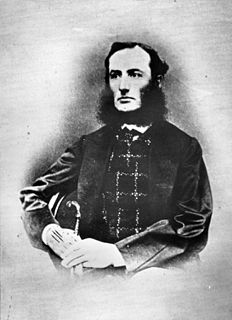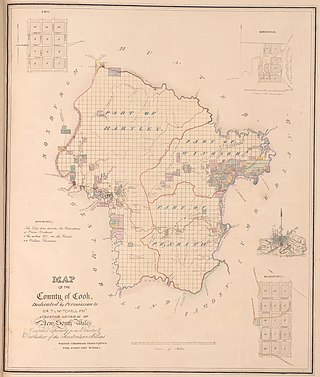Related Research Articles

Sir James Martin, QC was three times Premier of New South Wales, and Chief Justice of New South Wales from 1873 to 1886.

James Henry Young was an Australian colonial businessman and politician and Speaker of the New South Wales Legislative Assembly.
Thomas George Rusden was a squatter and politician in colonial New South Wales. He was a member of the Legislative Council between 1855 and 1856 and a member of the Legislative Assembly for one term between 1856 and 1857.

Ezekiel Alexander Baker was a member of the New South Wales Legislative Assembly.

The 1891 New South Wales colonial election was held in the then colony of New South Wales between 17 June to 3 July 1891. This election was for all of the 141 seats in the New South Wales Legislative Assembly and it was conducted in 35 single-member constituencies, 20 2-member constituencies, 10 3-member constituencies and nine 4-member constituencies, all with a first past the post system. Part 1 of the Electoral Act of 1880 set the qualification for election on "every male subject of Her Majesty of the full age of twenty-one years and absolutely free being a natural born or naturalized subject". Seven seats were uncontested. The previous parliament of New South Wales was dissolved on 6 June 1891 by the Governor, The Earl of Jersey, on the advice of the Premier, Sir Henry Parkes.

Abram Orpen Moriarty was an Irish-born Australian politician.

The Electoral district of Counties of Cook and Westmoreland, also known as the United Midland Counties of Cook and Westmoreland, was an electorate of the New South Wales Legislative Council at a time when some of its members were elected and the balance were appointed by the Governor.
A by-election was held for the New South Wales Legislative Assembly electorate of Cumberland South Riding in November 1856 because the Qualifications Committee declared the August by-election which returned Ryan Brenan was invalid as no poll had been conducted at Canterbury. Brenan was persuaded not to stand to allow Stuart Donaldson to regain a seat, having lost Sydney Hamlets in a ministerial by-election. A committee had been formed to secure the return of Augustus Morris, however it is unclear as to why he was not nominated.
A by-election was held for the New South Wales Legislative Assembly electorate of Parramatta on 20 April 1876 caused by the resignation of sitting member Hugh Taylor after he was referred to the Committee of Elections and Qualification as to whether he had a position of profit under the crown as a result of the supply of meat by him to Mr Dunn who in turn had a contract to supply meat to government asylums.
A by-election for the seat of Canterbury in the New South Wales Legislative Assembly was held on 28 July 1900 because the Elections and Qualifications Committee declared that the election of Sydney Smith, with a margin of 5 votes, at the by-election in June was void because of irregularities the way the returning officer dealt with unused ballot papers and that people had voted who did not have an elector's right at the time the writ was issued.
A by-election was held for the New South Wales Legislative Assembly electorate of Liverpool Plains on 28 October 1911 because the Elections and Qualifications Committee declared that the election of John Perry at the by-election on 16 August 1911 was void. Perry had been declared as winning the seat, with a margin of 3 votes and 91 informal votes, and William Ashford challenged the result before the Elections and Qualifications Committee.
A by-election was held for the New South Wales Legislative Assembly electorate of Braidwood on 17 October 1870 because the elections and qualifications committee declared the election of Michael Kelly to be void.
A by-election was held for the New South Wales Legislative Assembly electorate of Goldfields South on 12 December 1870 as a result of the Legislative Assembly declaring the election of Ezekiel Baker was void. Baker had been appointed to conduct a Royal Commission to inquire into the laws and regulations of the goldfields and for securing a permanent water supply. The Committee of Elections and Qualifications held that this appointment was an office of profit under the crown which meant he was incapable of being elected, or of sitting, or voting, as a member of the Assembly.
In October 1894 the Elections and Qualifications Committee conducted a re-count of the 1894 Grenfell election, in which George Greene had been declared elected by a margin of 2 votes over Michael Loughnane (Labour). The Elections and Qualifications Committee consisted of 9 members, 5 Free Trade and four Protectionist.
In March 1879 the Elections and Qualifications Committee overturned the 1879 Mudgee by-election, in which Richard Rouse had been declared elected by a margin of 1 vote over David Buchanan.
The Hastings, an electoral district of the Legislative Assembly in the Australian state of New South Wales was created in 1859 and abolished in 1880.
A by-election was held for the New South Wales Legislative Assembly electorate of The Hastings on 4 July 1870 as a result of the Legislative Assembly declaring the election of Horace Dean was void. Dean had been appointed the postmaster at Tinonee at the time of the nominations for the 1869 election and resigned the following day. The Committee of Elections and Qualifications held that because he had an office of profit under the crown at the time of his nomination meant he was incapable of being elected, or of sitting, or voting, as a member of the Assembly.
A by-election was held for the New South Wales Legislative Assembly electorate of Hartley on 21 April 1876 because the Committee of Elections and Qualifications found that Thomas Brown had an office of profit under the crown and declared that his seat was vacant.
A by-election was held for the New South Wales Legislative Assembly electorate of Hastings and Macleay on 23 September 1898 because Francis Clarke resigned to allow Edmund Barton to re-enter parliament.
In December 1885 the Elections and Qualifications Committee overturned the 1885 general election for Young, in which Gerald Spring and William Watson had been declared elected, with William Watson having a margin of 2 votes over James Mackinnon.
References
- ↑ Green, Antony. "1870 The Hastings by-election". New South Wales Election Results 1856-2007. Parliament of New South Wales . Retrieved 21 September 2020.
- 1 2 3 4 "The Hastings election". The Sydney Morning Herald . 24 September 1870. p. 4. Retrieved 21 September 2020– via Trove.
- ↑ Twomey, Anne (2004). The Constitution of New South Wales. Federation Press. pp. 399. ISBN 9781862875166 . Retrieved 21 September 2020.
- 1 2 "Petition: district of the Hastings". New South Wales Government Gazette . No. 45. 23 February 1870. p. 455. Retrieved 21 September 2020– via Trove.
- ↑ "Legislative Assembly: electorate of the Hastings". The Sydney Morning Herald . 7 May 1870. p. 4. Retrieved 21 September 2020– via Trove.
- ↑ "The Hastings petition". New South Wales Government Gazette . No. 197. 16 August 1870. p. 1755. Retrieved 21 September 2020– via Trove.
- ↑ "The Hastings election (from the Macleay Independent)". The Sydney Morning Herald . 28 June 1870. p. 3. Retrieved 21 September 2020– via Trove.
- 1 2 Electoral Act of 1858 No 23 (NSW) also identified as 22 Victoria No 20.
- ↑ Aliens Act 1847 No 39 (NSW), identified as 11 Victoria No 39.
- ↑ "Late election for the Hastings". Evening News . 30 July 1870. p. 2. Retrieved 21 September 2020– via Trove.
- ↑ Green, Antony. "1870 The Hastings election re-count". New South Wales Election Results 1856-2007. Parliament of New South Wales . Retrieved 21 September 2020.
- ↑ "In the Legislative Assembly". The Sydney Morning Herald . 29 September 1870. p. 6. Retrieved 22 September 2020– via Trove.
- ↑ "Macleay River". The Sydney Morning Herald . 1 August 1870. p. 2. Retrieved 21 September 2020– via Trove.
- ↑ "Mr Robert Burdett Smith CMG (1837-1895)". Former members of the Parliament of New South Wales . Retrieved 16 April 2019.